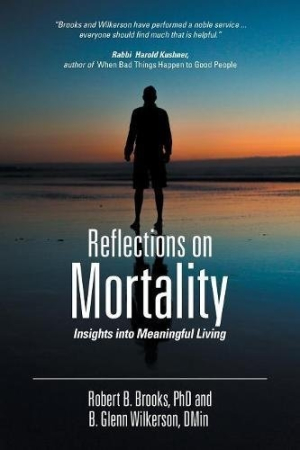Reflections on Mortality
Reflections on Mortality is a noteworthy addition to the literature about death and dying.
Some books, as Francis Bacon remarked, should be chewed and digested. Reflections on Mortality, a series of nineteen essays edited by Robert P. Brooks and B. Glenn Wilkerson, is one of them. This collection addresses the commonality of death and how its certainty can provide insights into meaningful living.
The book is organized around three themes. Part I focuses on several professional groups that are involved in the modern health-care industry: psychologists, who examine our relationship with death; neurosurgeons, who attempt to prevent it; hospice workers, who strive for dignified dying; and funeral directors, who deal with the inevitable.
The six essays in Part I are filled with insightful and striking stories, and they convey the difficulty each profession encounters in dealing with death. A hospice worker tells his account of unburdening himself from each day’s tragedies by placing his hand on a tree, freeing himself of the bad news to avoid poisoning his personal life. He states that “he knew it worked because the tree died eight months later.”
The essays in Part II reveal personal stories of people who have encountered death from different perspectives: a three-time cancer survivor, a military helicopter pilot who lived to tell tales of war, and a bereaved mother whose daughter committed suicide. Each story, while uniquely painful, is a testament to the resiliency of the human spirit and the discovery of meaning and purpose in one’s life when confronted with death.
People step up to the edge of an abyss and peer in. The doubt, anxiety, and futility expressed by the parent of a suicide is captivating in its honesty: “And the miracle we’d never once doubted would eventually come never came.”
Part III thoroughly examines many religious perspectives on the meaning of death. These essays are more traditional in their approach. If religion provides an insight into death and comforts those who mourn it, it says, that can be valuable. Christian, Buddhist, and atheist perspectives are shared.
All of the essays are about experiences with death, but their narratives and tones differ. When a person dies, an analytical neurosurgeon concludes, “Death means I failed.” Hospice workers are more practical.
Many of the essays include ideas from noted authors who have previously examined death and suffering, including Harold Kushner, Viktor Frankl, and Elisabeth Kübler-Ross. Extensive footnotes provide a valuable map for further reflection.
This is a work full of insights, such as that the knowledge of death changes a person’s relationship with time: everyone knows our time is finite, but death makes it intimately finite. Many essays look to poets for understanding, and topics are often explored through personal poetry.
Reflections on Mortality is a noteworthy addition to the literature about death and dying.
Reviewed by
Thomas H. Brennan
Disclosure: This article is not an endorsement, but a review. The publisher of this book provided free copies of the book and paid a small fee to have their book reviewed by a professional reviewer. Foreword Reviews and Clarion Reviews make no guarantee that the publisher will receive a positive review. Foreword Magazine, Inc. is disclosing this in accordance with the Federal Trade Commission’s 16 CFR, Part 255.

